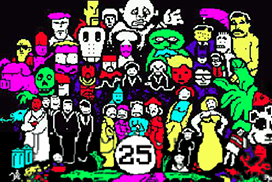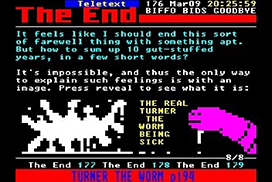
Page 28, press hold, and reveal. Digitiser's founder speaks out

|
Too much, too soon - and we're all paying for it
Edge #125, July 2003
Recently, I visited Minhehead in Somerset for an extended, out-of-season weekend of drinking wine from a jug and falling over. The 'Leading Holiday Camp' I had the grave misfortune to stay at was like a sort of Disneyland designed by pikies - a tawdry and soulless, Day-Glo affair, halfway between a concentration camp and a service station staffed by inbred lushes.
I kid thee not; while attempting to do nothing more sinister than buy sweets, I was forced to endure the teller's un-hilarious, 20-minute anecodte about how she and 'Craig' had woken up in a shopping trolley at 4am that morning without any recollection of how they'd got there. All the while being unsure which part of her misshapen, slack-jawed face to look at, on account of the fact that her eyes stared in two opposite directions at once.
That aside, I've always had a soft spot for the UK's most downmarket coastal resorts, especially during the quiet season. There's something uniquely English about the slightly anaemic, enforced jollity, and an appealing melancholy permeating the fish and chip shops, the empty beachfront funfairs, and musty, out-of-date arcades.
The latter are always a welcome haven for any games fan who wants to take a step back in time. Minehead's arcades are a typically quirky mix of the relatively recent and the really old and infirm. Thus, strolling through such establishment is like taking a geological drill-core sample of gaming's past.
In any one arcade you might find a rust-flecked bagatelle, a battered air hockey table, a fag-burned Street Fighter II Turbo cabinet, a Virtua Racing playing to no one from behind a dusty monitor, and a spanking new House of the Dead III with those excellent pump-action shotlightguns. What strikes home immediately when confronted with such a decades-spanning diorama is the speed at which the games industry has progressed.
Hilariously, I remember playing Road Rash on the 3DO and thinking that game graphics really couldn't get any better (then again, I also used to believe that the images on my television were the trapped ghosts of restless sailors). In part, that may have been an over-optimistic assessment, or just a case of misplaced wishful thinking; some small bit of me, at least for a month or four, totally bought into the 3DO dream of a singleformat games industry (nowadays, I'm more sceptical). Alas, as history recalls, fate was the whale to the 3DO's Jonah, and game graphics took a new ubiquitous generational leap within 12 months. Where is 3DO's dream today? Rotting, and jammed in some metaphorical sea-monster's blowhole.
Videogaming advances so quickly, it's a wonder we don't all have the technological bends. From the perspective of someone who flirts with the notion of being a hardcore gamer, it doesn't really bother me. But were I a more casual consumer, I'd find such rapid progress rather intimidating.
From the first public showing in 1895 of moving pictures projected onto a screen, it took 27 years before the first Technicolor feature film was made, and a further five years before we got the first talking picture. And even then it was about a white man singing about his 'mammy' while pretending to be a black man. Admittedly, new technical processes, better special effects and so forth have evolved behind the scenes, but on the whole - as far as the layman is concerned - film-making has advanced in a slow, steady and mostly organic fashion.
Imagine if the film industry had gone from flickering zoetrope imagery to 3D holovision in space of 15 years. Terrified Luddites would likely have brought about the collapse of ordered society. Aside from the fact that game content is still tailored primarily for the 15-year-old schoolboy in us all, it's little wonder that vast swathes of the public couldn't give a winker's truss for games.
What's that you say? But games are bigger than films or music? Don't be so naive. That's what they want you to think. In fact, we're nothing more than members of a cult. Admittedly, we're a huge cult that has sat its pouting buttocks atop the pop culture bubble - but we're a cult all the same. And to the unconverted we're a bunch of freaks, geeks, and - like it or not, coolboys - hardware-fixated sad cases.
Females? Old people? Anyone aged 40 and upwards? Aside from the odd game of Tetris, or a rickety and reluctant post-Christmas-dinner spin on a PS2 dancemat, these people care not a jot for our hobby. Those news stories you read about the games industry now being worth more than the music and film industries mean precisely this: Bo-Diddly-squat.
Yeah, more money may change hands between punters and games retailers, but that's primarily because games cost eight times as much as a cinema ticket, and three-and-a-bit times as much as a new CD. Everyone listens to music. Almost everyone goes to the cinema or rents DVDs. Games remain a long way from becoming the same sort of massmarket commodity. And ITV's 'Game Stars' is unlikely to have won over many new supporters.
Getting back to my seaside arcades, the interesting thing was that the people in these places weren't hardcore gamers. They were, I'd wager, a mix of 'Sun' readers, holidaying kids who might own a PSone and, yes, the occasional sweet-peddling lush. To wit: the very massmarket that games allegedly now sell to. From the fact Star Wars and Sega Rally were getting more interest than House of the Dead III, I'd suggest that the common man isn't greatly concerned with realtime lighting and NURBS. He just wants to play games now and then. What's more, he probably doesn't relish the fact that he's continually being told his home hardware is out-of-date - either by virtue of competing new systems, or his console manufacturer's own, catalogue-spoiling, four-year strategy. Yeah, games are getting more popular year-by-year, but if we're not careful this constant race to move forward could eventually end up holding the industry back.
I'm not advocating a single format that hangs around for as long as, say, VHS - or any single format whatsoever. But it would be a safer and more sensible proposition all round for the entire games industry - from the smallest software developer to the most swollen console giant - if a more long-term, unified strategy was considered. What should that strategy be? How should I know? I spend my weekends getting pissed at the seaside...
Mr Biffo is a semi-retired videogame journalist. His views do not necessarily coincide with Edge's
Do you know of any important moments from the annals of Digi history that have been omitted? If so, then mail me (superpage58@gmail.com) right now, man. Credit will be duly given for anything that gets put up.










